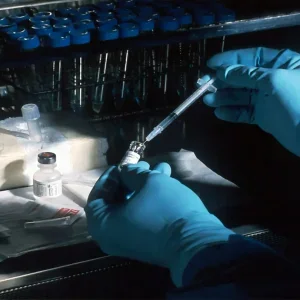Eisai and Biogen said that the investigational subcutaneous (SC) formulation of their Alzheimer’s drug Leqembi (lecanemab-irmb) clears 14% more amyloid plaques as measured by PET compared to intravenous infusion (IV), with pharmacokinetics (AUC) 11% higher and similar ARIA rates.
Leqembi is a humanised immunoglobulin gamma 1 (IgG1) monoclonal antibody. It is designed to target aggregated soluble (protofibril) and insoluble forms of amyloid-beta (Aβ).
The medicine can be easier to use if administered as two consecutive shots once a week. This would enable patients to receive the medication at home rather than having to visit an infusion facility twice a month.
The Japanese company compared data from earlier trials involving 898 patients who received Leqembi by infusion to data from 72 individuals with early-stage Alzheimer’s treated with the medication via subcutaneous injection.
As per the results of the 18-month trial, the medicine delayed cognitive decline by 27% for persons with early Alzheimer’s disease, and the intravenous (IV) form of Leqembi was approved in the US.
In addition, the blood concentration levels of the drug were documented as 11% higher with subcutaneous Leqembi than with the IV version.
For the subcutaneous formulation, rates of major side events were found higher than rates of infusion- or injection-related side effects.
ARIA-E-measured brain swelling incidence was 16.7% in the subcutaneous group and 12.6% in the intravenous group.
Furthermore, 22.2% of the subcutaneous patients experienced ARIA-H, or brain haemorrhage compared to 17.3% of the IV group.
In a separate development, Eisai announced an analysis of a small subgroup of patients from its trial who had early Alzheimer’s and low levels of tau, a second protein associated with disease progression.
As per the results, 60% of patients in low-tau population showed improvement in cognitive function, compared with 28% of the placebo group and 76% of patients showed no decline.
Eisai plans to submit the Alzheimer’s drug SC formulation for Biologics License Application (BLA) based on data from 394 patients to the US Food and Drug Administration (FDA) by the end of March next year.






